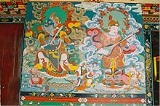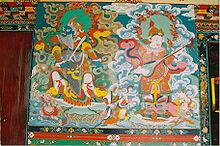
Tibetology
Encyclopedia
Tibetology refers to the study of things related to Tibet
, including its history
, religion
, language
, politics and the collection of Tibetan articles of historical, cultural and religious significance. The last may mean a collection of Tibetan statues, shrines, Buddhist icons and holy scripts, Thanka embroideries, paintings and tapestries, jewellery, masks and other objects of fine Tibetan art
and craftsmanship.
The publications of the British diplomat Charles Alfred Bell
contributed towards the establishment of tibetology as an academic discipline. As outstanding tibetologists of the 20th century the British Frederick William Thomas
, David Snellgrove
, Michael Aris
, and Richard Keith Sprigg
, the Italians Giuseppe Tucci
and Luciano Petech
, the Frenchmen Jacques Bacot
and Rolf Alfred Stein, finally the Germans Dieter Schuh
and Klaus Sagaster, may be mentioned.
 Since a few decades, particularly in Anglo-Saxon countries, the study of Tibet and Tibetology open itself towards other disciplines, resulting in works with interdisciplinary approach. This has become most obvious in the regular conferences of the IATS (International Association of Tibetan Studies), held at intervals of three years in different cities all over the world. As examples of such open-minded Tibet researcher we might mention the American anthropologist Melvyn Goldstein
Since a few decades, particularly in Anglo-Saxon countries, the study of Tibet and Tibetology open itself towards other disciplines, resulting in works with interdisciplinary approach. This has become most obvious in the regular conferences of the IATS (International Association of Tibetan Studies), held at intervals of three years in different cities all over the world. As examples of such open-minded Tibet researcher we might mention the American anthropologist Melvyn Goldstein
, among others, who has done noted research and publications on lexical questions, about Tibetan nomads and the modern history of Tibet. Others are Robert Barnett, Matthew Kapstein
, Elliot Sperling, Alex McKay, Geoffrey Samuel, and many more.
Tibet
Tibet is a plateau region in Asia, north-east of the Himalayas. It is the traditional homeland of the Tibetan people as well as some other ethnic groups such as Monpas, Qiang, and Lhobas, and is now also inhabited by considerable numbers of Han and Hui people...
, including its history
History of Tibet
Tibetan history, as it has been recorded, is particularly focused on the history of Buddhism in Tibet. This is partly due to the pivotal role this religion has played in the development of Tibetan, Mongol, and Manchu cultures, and partly because almost all native historians of the country were...
, religion
Tibetan Buddhism
Tibetan Buddhism is the body of Buddhist religious doctrine and institutions characteristic of Tibet and certain regions of the Himalayas, including northern Nepal, Bhutan, and India . It is the state religion of Bhutan...
, language
Tibetan language
The Tibetan languages are a cluster of mutually-unintelligible Tibeto-Burman languages spoken primarily by Tibetan peoples who live across a wide area of eastern Central Asia bordering the Indian subcontinent, including the Tibetan Plateau and the northern Indian subcontinent in Baltistan, Ladakh,...
, politics and the collection of Tibetan articles of historical, cultural and religious significance. The last may mean a collection of Tibetan statues, shrines, Buddhist icons and holy scripts, Thanka embroideries, paintings and tapestries, jewellery, masks and other objects of fine Tibetan art
Tibetan art
Tibetan art refers to the art of Tibet. For more than a thousand years, Tibetan artists have played a key role in the cultural life of Tibet. From designs for painted furniture to elaborate murals in religious buildings, their efforts have permeated virtually every facet of life on the Tibetan...
and craftsmanship.
History
- The Jesuit Antonio de AndradeAntónio de AndradeFather António de Andrade was a Jesuit priest and explorer from Portugal. He entered the Society of Jesus in 1596. From 1600 until his death in 1634 he was engaged in missionary activity in India...
(1580–1634) and a few others established a small mission and church in TsaparangTsaparangTsaparang was the capital of the ancient kingdom of Guge in the Garuda Valley, through which the upper Sutlej River flows, in Ngari Prefecture near the border of Ladakh. It is 278 km south-southwest of Ali and 26 km west of the 11th century monastery at Thöling, and not far west of Mount Kailash...
(1626), in the kingdom of GugeGugeGuge was an ancient kingdom in Western Tibet. The kingdom was centered in present-day Zanda County, within Ngari Prefecture of Tibet Autonomous Region, China. At various points in history after 10th century AD, the kingdom held sway over a vast area including south-eastern Zanskar, Upper Kinnaur,...
(Western Tibet) in the 17th century. When the kingdom was overrun by the king of LadakhLadakhLadakh is a region of Jammu and Kashmir, the northernmost state of the Republic of India. It lies between the Kunlun mountain range in the north and the main Great Himalayas to the south, inhabited by people of Indo-Aryan and Tibetan descent...
(1631), the mission was destroyed. - A century later another Jesuit, the ItalianItalyItaly , officially the Italian Republic languages]] under the European Charter for Regional or Minority Languages. In each of these, Italy's official name is as follows:;;;;;;;;), is a unitary parliamentary republic in South-Central Europe. To the north it borders France, Switzerland, Austria and...
Ippolito DesideriIppolito DesideriIppolito Desideri was an Italian Jesuit missionary in Tibet and the first European to have successfully studied and understood Tibetan language and culture.-Biography:...
(1684–1733) was sent to Tibet and received permission to stay in LhasaLhasaLhasa is the administrative capital of the Tibet Autonomous Region in the People's Republic of China and the second most populous city on the Tibetan Plateau, after Xining. At an altitude of , Lhasa is one of the highest cities in the world...
where he spent 5 years (1716–1721) living in a Tibetan monastery, studying the language, the religion of the lamasLamasLamas may refer to the following places:*Lamas Province, Peru*Lamas, Peru, capital of the province*Lamas , Portugal*Lamas , Portugal*Lamas , Portugal*Lamas , Portugal*Santa Maria de Lamas, Portugal...
and other Tibetan customs. He published a couple of books in Tibetan on Christian doctrine. Because of a conflict of jurisdiction (the mission was entrusted to the CapuchinsOrder of Friars Minor CapuchinThe Order of Friars Minor Capuchin is an Order of friars in the Catholic Church, among the chief offshoots of the Franciscans. The worldwide head of the Order, called the Minister General, is currently Father Mauro Jöhri.-Origins :...
, and not to the Jesuits) Desideri had to leave Tibet and returned to Italy, where he spent the rest of his life publishing his Historical notes on Tibet. They were collected, in 4 volumes, under the title of Opere Tibetane (Rome;1981–1989). Desideri may be considered as the first Tibetologist and he did much to make Tibet known in Europe. - Desideri was however a pioneer, and as such what he produced were rather 'observations' on Tibet, a work he did with objectivity and sympathy, but not always perfect accuracy. The inception of Tibetology as an authentic academic discipline is thus associated with the Hungarian Kőrösi Csoma Sándor Alexander Csoma de KőrösSándor Korösi CsomaSándor Kőrösi Csoma , born Csoma Sándor, also known as Alexander Csoma de Kőrös, was a Hungarian philologist and orientalist, author of the first Tibetan-English dictionary and grammar book. He was born in Kőrös, Grand Principality of Transylvania...
(1784–1842) who is considered as its founder to present day, the other early tibetologists of note being Philippe Édouard FoucauxPhilippe Édouard FoucauxPhilippe Édouard Foucaux was a French tibetologist. He published the first Tibetan grammar in French and occupied the first chaire of Tibetan studies in Europe....
who in 1842 occupied the first chair for Tibetan studies in Europe and Isaac Jacob SchmidtIsaac Jacob SchmidtIsaac Jacob Schmidt was an Orientalist specializing in Mongolian and Tibetan. Schmidt was a Moravian missionary to the Kalmyks and devoted much of his labours to bible translation....
, who was primarily the pioneering mongolist residing in Saint Petersburg.
The publications of the British diplomat Charles Alfred Bell
Charles Alfred Bell
Sir Charles Alfred Bell K.C.I.E. , born in Calcutta, was a British-Indian tibetologist. He was educated at Winchester College. After joining the Indian Civil Service, he was appointed Political Officer in Sikkim in 1908...
contributed towards the establishment of tibetology as an academic discipline. As outstanding tibetologists of the 20th century the British Frederick William Thomas
Frederick William Thomas
Sir Frederick William Thomas AE was Lord Mayor of Melbourne from 1957–1959, having been persuaded to stand for Council by his friend Field Marshal Sir Thomas Blamey. During World War II, he served as a Group Captain in the Royal Australian Air Force...
, David Snellgrove
David Snellgrove
David Llewellyn Snellgrove is a British Tibetologist noted for his pioneering work on Buddhism in Tibet as well as his many travelogues.-Biography:...
, Michael Aris
Michael Aris
Michael Vaillancourt Aris was a leading Western authority on Bhutanese, Tibetan, and Himalayan culture, and wrote numerous books on Buddhism in those regions. He was the husband of Burmese opposition politician Aung San Suu Kyi....
, and Richard Keith Sprigg
Richard Keith Sprigg
Dr Richard Keith Sprigg was a British linguist who specialized in the phonology of Asian languages. Sprigg was educated under J. R. Firth and was a member of the first generation of professional British linguists. Also as a consequence Sprigg was an advocate of the prosodic phonological method of...
, the Italians Giuseppe Tucci
Giuseppe Tucci
Giuseppe Tucci was an Italian scholar of oriental cultures, specialising in Tibet and history of Buddhism. During its zenith, Tucci was a supporter of Italian Fascism, and he used idealized portrayals of Asian traditions to support Italian ideological campaigns...
and Luciano Petech
Luciano Petech
Luciano Petech was an Italian scholar of Himalayan history and the early relations between Tibet, Nepal and Italy. He was Chair of History of Eastern Asia at the University of Rome from 1955 to 1984. He is the most renowned of the students of Giuseppe Tucci.Luciano Petech was born in 1914 and...
, the Frenchmen Jacques Bacot
Jacques Bacot
Jacques Bacot was an explorer and pioneering French Tibetologist. He travelled extensively in India, western China, and the Tibetan border regions. He worked at the École pratique des hautes études. Bacot was the first western scholar to study the Tibetan grammatical tradition, and along with F. W...
and Rolf Alfred Stein, finally the Germans Dieter Schuh
Dieter Schuh
Dieter Schuh is a German Tibetologist, entrepreneur and politician.-Life:Born in 1942, Schuh graduated in 1972 at Rheinische Friedrich-Wilhelms University in Bonn and submitted his habilitation in 1976. Since 1978 he is Professor of Tibetan Studies...
and Klaus Sagaster, may be mentioned.

Melvyn Goldstein
Melvyn C. Goldstein is a US-American anthropologist and Tibet scholar. His research focuses on Tibetan society, history and contemporary politics, population studies, polyandry, studies in cultural and development ecology, economic change and cross-cultural gerontology.-Personal...
, among others, who has done noted research and publications on lexical questions, about Tibetan nomads and the modern history of Tibet. Others are Robert Barnett, Matthew Kapstein
Matthew Kapstein
Matthew Kapstein is a scholar of Tibetan religions and Buddhism at the University of Chicago Divinity School. One of his study areas has concentrated on Tibetan culture and the influence of China's invasion.- Works :...
, Elliot Sperling, Alex McKay, Geoffrey Samuel, and many more.
External links
- IATS - The International Association of Tibetan Studies
- Tibetology Network
- Tibetan & Himalayan Digital Library
Literature
- Tsering Shakya: The Development of Modern Tibetan Studies. In: Robert Barnett (Hg.): Resistance and Reform in Tibet (Bloomington/Indianapolis, Indiana University Press 1994), ISBN 0-253-31131-4, S. 1–14.

